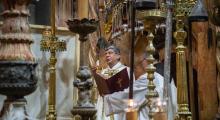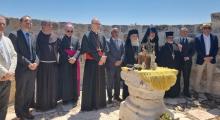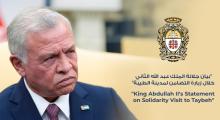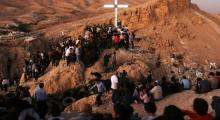Issued by the Catholic Center for Studies and Media - Jordan. Editor-in-chief Fr. Rif'at Bader - موقع أبونا abouna.org
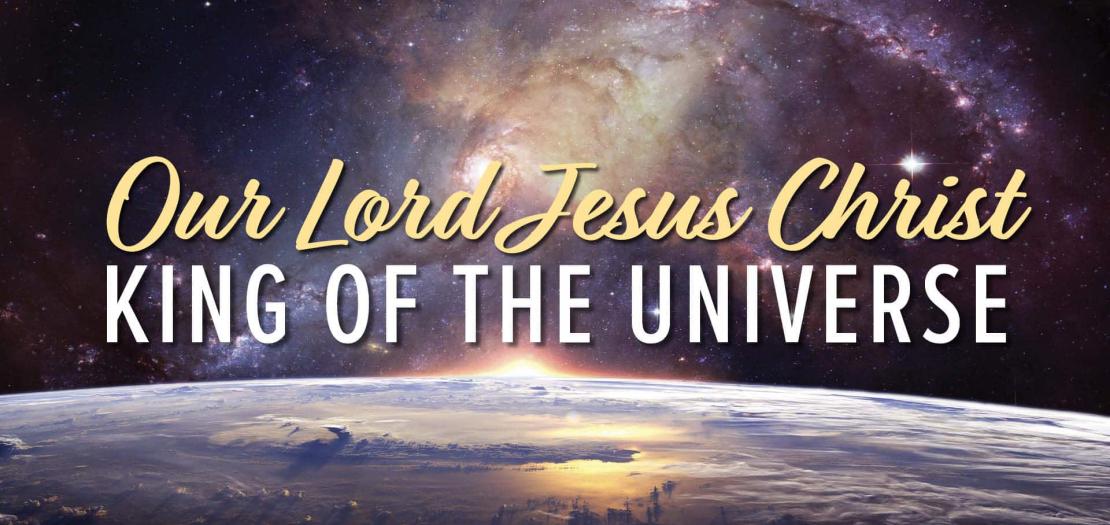
Following is the text of the meditation by Latin Patriarch of Jerusalem His Beatitude Pierbattista Pizzaballa for the Solemnity of Lord Jesus Christ the King of the Universe, the 34th Sunday of Ordinary Time, year B, November 21, 2021:
The liturgical year ends this Sunday with the Solemnity of Christ King of the Universe.
And the passage from the Gospel (John 18:33-37) shows us the meeting between Pilate and Jesus during the process that will lead Him to death. While the Jewish judicial process provided for the presence of witnesses, for or against the accused, the Roman one was based on the judge’s interrogation; so, in this case, we witness an intense face to face between the two, who dialogue on a fundamental theme.
The dialogue is between Jesus, King of the Jews, and Pilate, the representative of Roman power, of earthly royalty.
The dialogue revolves around the theme of royalty: Pilate asks Jesus if He is the King of the Jews (Jn 18:33). The term “king,” during the entire process, occurs 12 times: this is the big problem, the great challenge of man, knowing who the king is.
And it is interesting that this question does not emerge from the leaders of the people, who had handed Jesus over to Pilate: they look good even when they say these words, and deliver Jesus saying he is a criminal (John 18:30). And when Pilate puts the inscription on the cross, which attests to the kingship of Jesus, they will have to say, and try to change it by specifying that Jesus is not the king, but only that he has defined Himself as such (Jn 19:21).
From this, we, also, understand how the question is central.
For Jesus it is not a new question, on the contrary, it seems that the theme of royalty accompanies His path from beginning to end. In the Gospel of Matthew (Mt 2:7ff), immediately after His birth, Jesus is confronted by a king, and immediately it will appear clear there cannot be that two kings, side by side. Herod will try to kill this child who has been called king: there is room for only one king.
The problem, however, is to understand what is meant by a king, and, in the Bible, this is a decisive question.
To help us understand, let’s take a step back, and go to an episode told in the book of Daniel (Dn 3). The event concerns some young Israelites from the Diaspora, deported to Babylon during the exile. The boys had been brought to court and educated according to the best knowledge of the place, but they had remained faithful to their customs. Therefore, when a proclamation is issued that asks everyone to kneel before the statue of King Nebuchadnezzar, they refuse: they kneel only before God because He is the only true King, the only Lord.
Here, this episode makes us understand what kingship Jesus accepts to be Lord.
If the earthly kings pretend that they kneel in front of them, and ask for honor and power, Jesus does precisely the opposite. A few days before what is happening in today’s passage, Jesus not only does not pretend that we are prostrate before Him, but He who takes off His outer robe and stoops to wash the feet of His disciples (Jn 13:1-5), as a slave does with his master.
Jesus is King, but not according to the categories of glory and power: he is King in service and humility, in the gift of himself. He does not deny being a king but says He is different, according to a different logic.
Therefore, He will say to Pilate that His kingdom is not of this world: His authority does not come to Him from men, because if that were the case, He would defend it by force. Instead, when someone tries to protect Him, like Peter in Gethsemane (Jn 18:10-11), Jesus will distance Himself from this attitude, reaffirming His complete willingness to embrace the logic of the Father, with total trust.
The kingdom of which Jesus is king has, therefore, no armies and no territory to defend.
It has only one aim: to show the truth to men (John 18:37), which makes them free, free as were the young Israelites deported to Babylon, whom we met in the prophet Daniel: thrown into the furnace, they strolled among the flames, prayed and praised God (Dn 3,24). In their prayer, they recognized that they were sinners, but they were sure that God would not abandon them, because there is no disappointment for those who trust in Him (Dn 3:40).
That is the truth, and it is an eternal truth, which overcomes death.
That is why it can be a mild truth because a truth that needs to be imposed by force is not a truth, it is ideology. Ideology fears death, fearing that its deception will be unmasked; Truth also shines in tribulation and persecution and does not fear losing everything.
Finally, the Kingdom of which Jesus is Lord extends His dominion not so much over peoples and regions as over the life of those who hear His voice and make a transition from death to life.
And to do this, it has a single means, a unique weapon: it is the Word, so whoever listens puts him/herself in the Truth and become a living person, a free person.
So, Pilate evidently cannot understand Jesus: between the two, there is an abysmal distance. Pilate will prove to be a prisoner of his fears, of the fear of losing his power, and so he will miss the opportunity to know the truth that sets free.
+Pierbattista




